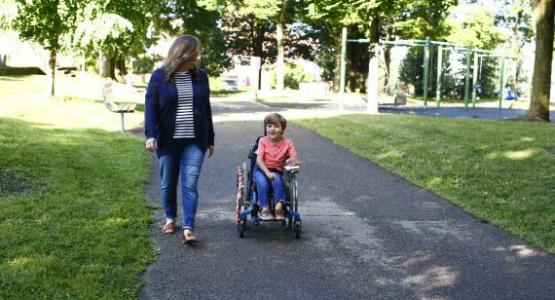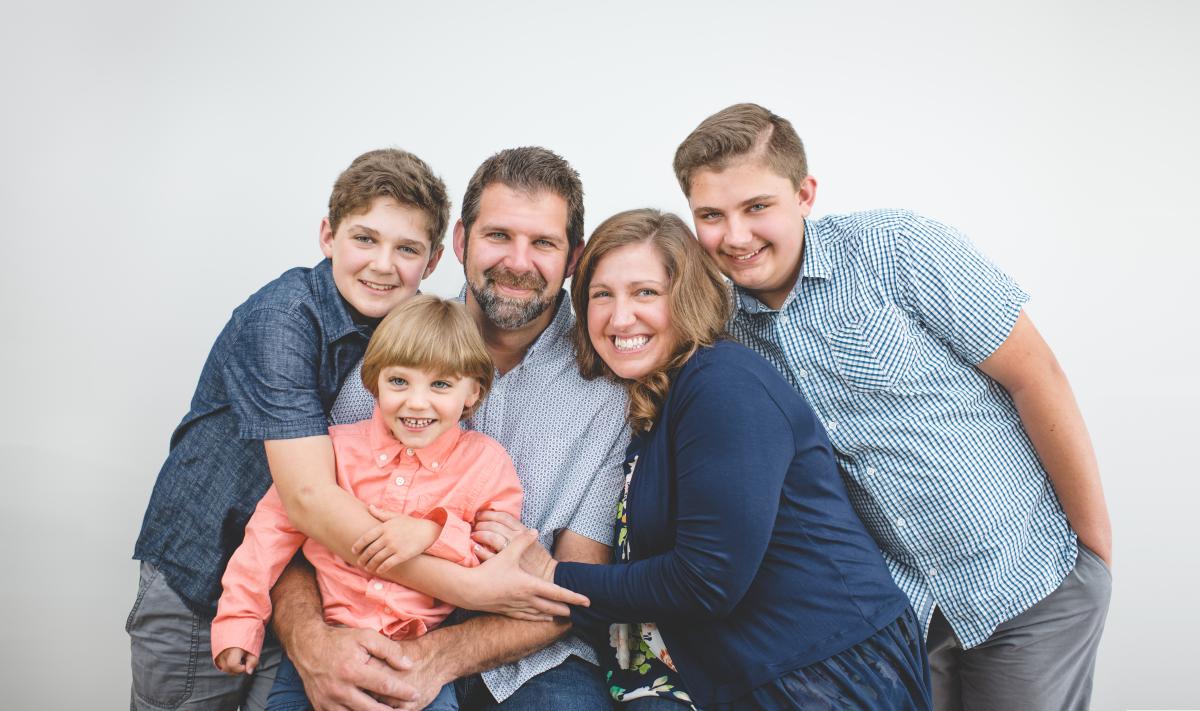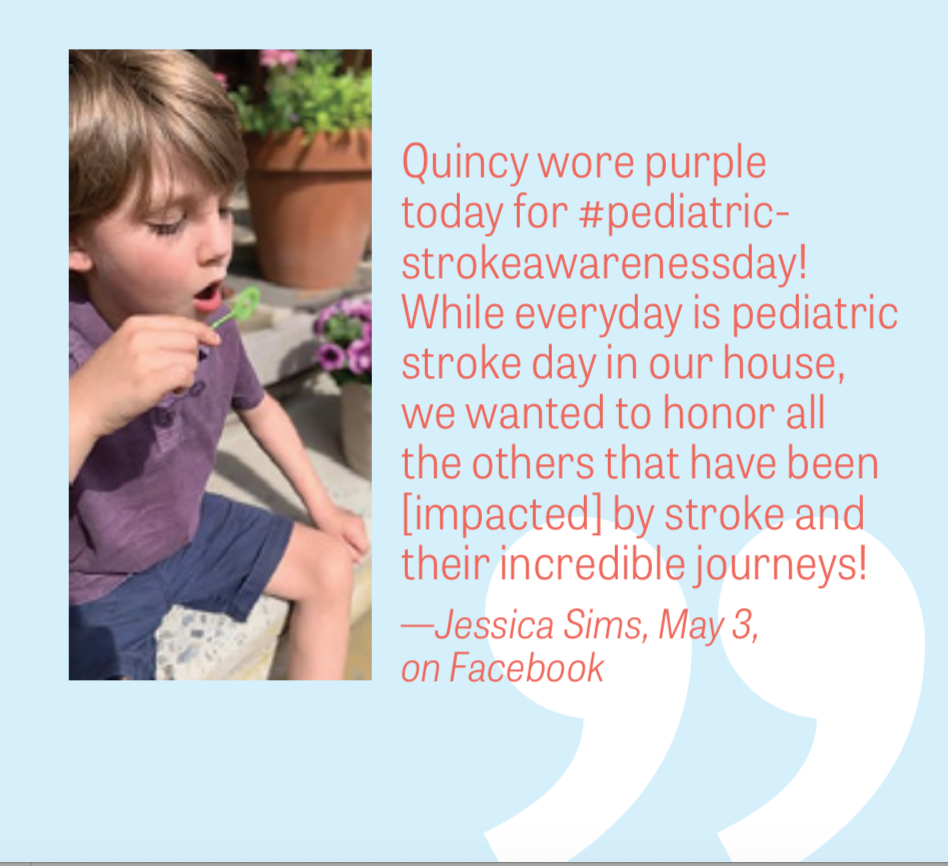
Feature: Quincy's Quest
For many people, the internet and social media are platforms to show an idealized version of themselves and rack up likes, hearts and emojis. But when Jessica Sims and other members bravely shared their struggles with the realities of life, they found meaningful connections, heartfelt prayers, much-needed support and opportunities to witness.
Story by Tompaul Wheeler/ Photos by Jared Wickerham/AP Images and courtesy of Calhoun Photography
When Jessica Sims gave birth to Quincy, her third son, in 2013, all seemed well. Then he started seizing. He was flown to Pittsburgh, where doctors determined he’d had a stroke shortly before his birth.
The stroke affected 60 percent of Quincy’s brain. “He was given a very grim prognosis,” Jessica remembers. “We didn’t post anything online right away, but people were praying for us, and I feel like it was those prayers that kept us going.”
 Given the severity of Quincy’s stroke, doctors were surprised he had lived through it. A genetic marker had predisposed Quincy to blood clots. “His MRIs kind of take my breath away,” Jessica says. “It looks like a yin-yang. His whole left side [brain activity] is completely gone, and his frontal lobe is gone from the stroke.” The unaffected portion of Quincy’s brain has demonstrated incredible neuro-plasticity, as it adapts and reassigns neurons to compensate for what was damaged.
Given the severity of Quincy’s stroke, doctors were surprised he had lived through it. A genetic marker had predisposed Quincy to blood clots. “His MRIs kind of take my breath away,” Jessica says. “It looks like a yin-yang. His whole left side [brain activity] is completely gone, and his frontal lobe is gone from the stroke.” The unaffected portion of Quincy’s brain has demonstrated incredible neuro-plasticity, as it adapts and reassigns neurons to compensate for what was damaged.
“We had our life planned out, and God had other plans,” Jessica reflects. “I had to quit my fulltime teaching job to care for Quincy. We had been very comfortable, and we went from that to relying 100 percent on God for everything. Doctors told us he wouldn’t live 10 days, and he’s just celebrated his sixth birthday. They told us he’d be blind and deaf and would never walk or sit on his own. And just three months ago, he started being able to walk independently with a walker. He can see on the left side of both of his eyes. He has compensated amazingly. His hearing is exceptional.”
Though Quincy occasionally stutters in his speech “when his brain can’t keep up with what he wants to say,” he’s continuing to progress in that and other areas. “He can voice what he wants. He can have a whole conversation," Jessica says.
 This summer they’re headed back to Pittsburgh for eight weeks of physical therapy, with the goal of building his strength and endurance so he can participate in a full-day kindergarten program and interact with his peers.
This summer they’re headed back to Pittsburgh for eight weeks of physical therapy, with the goal of building his strength and endurance so he can participate in a full-day kindergarten program and interact with his peers.
Jessica and her husband, K. C., have primarily shared their story through Facebook, on a page called Quincy’s Quest. “Of course I keep some things private for the sake of Quincy and my two older sons,” Jessica says. “The doctors and science said Quincy wouldn’t live, but obviously God had another plan. We always try to make sure people know that we feel God intervened.”
The family’s decision to share their journey online has both raised awareness of pediatric strokes and plugged them into a broader community. “We’ve received a tremendous amount of support from people saying, ‘Hey, if you need anything, I’m here.’ It’s that sense of community you might not otherwise have gotten if it weren’t for social media.
 For the Sims family, who attend the Pennsylvania Conference’s Everett church, sharing their story online is a two-way street. “One of the things my husband and I said early on,” Jessica reflects, “is that of course we didn’t want this [illness] for Quincy; we didn’t want our lives turned upside down. But our son has a very bubbly personality. People are drawn to him. I definitely think God has worked through him.”
For the Sims family, who attend the Pennsylvania Conference’s Everett church, sharing their story online is a two-way street. “One of the things my husband and I said early on,” Jessica reflects, “is that of course we didn’t want this [illness] for Quincy; we didn’t want our lives turned upside down. But our son has a very bubbly personality. People are drawn to him. I definitely think God has worked through him.”
The Sims value how social media enables them to share and connect, especially when Quincy’s therapy separates them for weeks at a time. “Even 20 years ago, I wouldn’t have been able to quickly share a video with my family,” Jessica says. “It’s a blessing to me to know I’m not out in Pittsburgh by myself. I know there are people rooting for us and caring for us. And of course meeting other parents who are going through similar things. ... I see [social media] as a way of connecting with people, or people who might not otherwise be able to say, 'Hey I've been praying for you.' I know if I needed anything all I'd need to do is send a quick message or Facebook post, because people are there for you."
 Read articles from the July/August 2019 Visitor:
Read articles from the July/August 2019 Visitor:
Columbia Union Members Named Fulbright Scholars
Students Receive Caring Heart Awards
Dos and Don'ts of Church Social Media
Book Release: The Anabaptist Remnant
More articles coming soon!

Add new comment